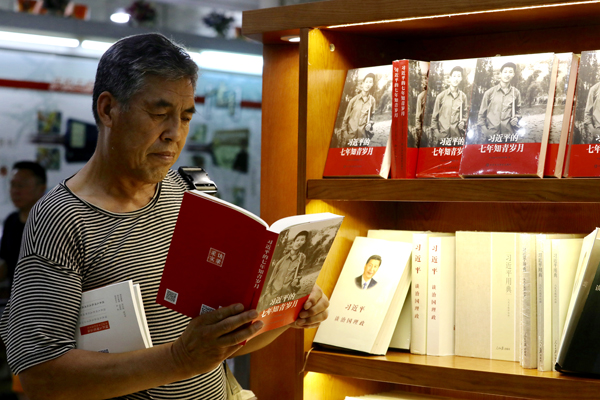Book highlights President Xi's time in village
A newly published book of the seven years that President Xi Jinping spent at a poor village four decades ago has gained popularity soon after its debut, with many analysts saying the book is encouraging and enlightening.
|
|
|
A customer reads "Xi Jinping's Seven Years as an Educated Youth" in Wangfujing Bookstore in Beijing on Aug. 20. [Photo/China Daily] |
The book, "Xi Jinping's Seven Years as an Educated Youth," was a collection of interviews with people who used to live and work with Xi when he was a "zhiqing," or educated youth, in Liangjiahe village, Yanchuan county, Shaanxi province, from 1969 to 1975.
"Zhiqing" refers to urban youths sent to the countryside for "re-education" amid late chairman Mao Zedong's campaign for urban youth to experience rural labor during the "cultural revolution" (1966-76). Xi was only 15 when he was sent to Liangjiahe in early 1969.
The book was brought out by the Publishing House of the Party School of the CPC Central Committee.
He Yiting, executive vice-president of the Party School of the CPC Central Committee, said Liangjiahe was Xi's first stop to get into society, and his life in the village had a great influence on him.
After its debut last week, the book became so popular that the publishing house staff has been working around the clock to meet demand, he said at a seminar on Sunday to discuss the book.
The book is a vivid text for young people to set up a positive outlook on their lives, and it also tells Party officials of all levels about how to act in accordance with the Party's discipline, he added.
In the book, 29 people were interviewed, including some other "educated youths" who worked with Xi in the village and Liangjiahe villagers who worked with Xi for years. They recalled how Xi strove to help farmers and remain optimistic about life in the difficult period.
For example, Zhang Weipang, a Liangjiahe farmer, said in the book that "no matter how bad the food was, Jinping would have a good appetite, and no matter how poor a person was, Jinping would never despise him." In another story, a villager recalled how Xi helped him find a lost pig-the most valuable asset of the poor family.
During his time in the poverty-stricken village, Xi led villagers to accomplish various things, such as building the first methane-generating pit in north Shaanxi to improve the peoples' livelihood. His down to earth spirit won the recognition of and compliments from the villagers.
"I found myself easily traveling several kilometers of mountain road while carrying a shoulder pole weighing more than 50 kilograms," Xi said in a previous interview with China Central Television.
Tao Haisu, who used to work with Xi as a "zhiqing" at Liangjiahe, said at the seminar that "the sweat that Xi shed with the people" has deep and great influence on the president's thoughts.
"If you understand Xi's experience at Liangjiahe, you will understand the measures he had taken after the 18th National Congress of the Party, and you will know why he deeply hates the corrupt officials who bully the people," he said.
Xuan Yong, Party secretary of Zhejiang International Studies University, said at the seminar that the book is enlightening for young people, and the university will arrange for students to read the book.
The university also will dispatch volunteers to Liangjiahe during next year's summer holiday to elaborate on the stories of Xi for those who visit the village, he said, adding that the president's spirit of keeping firm belief at difficult times should be learned by the nation's youth.
Liu Dawei, assistant minister of education, said that by looking back at the history in the book, readers will be much more confident about the future of the country.
